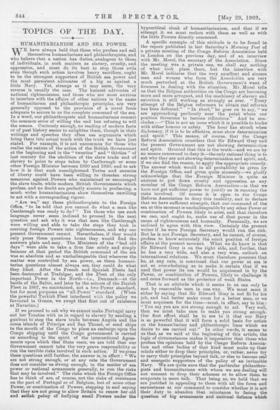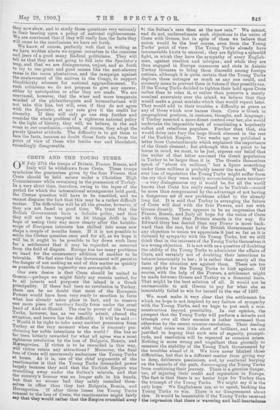TOPICS OF THE DAY.
HUMANITARIANISM AND SEA. POWER.
WE have always held that those who profess and call themselves humanitarians and philanthropists, and who believe that a nation has duties, analogous to those of individuals, in such matters as slavery, cruelty, and oppression, and must do its best to stop those evils even though such action involves heavy sacrifices, ought to be the strongest supporters of British sea power and the most persistent advocates of a big as against a little Navy. Yet, strange as it may seem, the very reverse is usually the case. The keenest advocates of national righteousness, and those who are most anxious to interfere with the affairs of other nations in the name of humanitarian and philanthropic principles, are very generally opposed. to the provision of a naval force adequate to secure to us the complete command of the sea. In a word, our philanthropists and humanitarians commit the common error of willing the end but refusing to will the means. Curiously enough, no reading of modern facts or of past history seems to enlighten them, though in their writings and speeches they often use arguments which bring them into actual touch with the truth we have just stated.. For example, it is not uncommon for those who realise the nature of the action of the British Government at the beginning and in the " twenties " and " thirties " of last century for the abolition of the slave trade and of slavery to point to steps taken by Castlereagh or some other Foreign Minister between 1800 and 1830, and to ask how it is that such unenlightened Tories and enemies of liberty could have been willing to threaten strong measures against Powers who maintained or encouraged the slave trade, while modern British Governments which profess, and no doubt are perfectly sincere in professing, a much wider humanitarianism show themselves unwilling to act with a corresponding vigour.
" Are we," say these philanthropists to the Foreign Office, "to be told that you cannot do what a man like Castlereagh was ready to do ? " Yet those who use such language never seem inclined to proceed to the next question and ask why it was that men like Castlereagh were willing and able to take the steps they took in coercing foreign Powers into righteousness, and why our present Government cannot. Nevertheless, if they would only press these questions home they would find the answers plain and easy. The Ministers of the "bad old days " were able to take a firm line solely and simply because at that period the British command of the sea was so absolute and so unchallengeable that wherever the matter was controlled by sea power, as these humani- tarian questions almost always are, they could. do what they liked. After the French and Spanish Fleets had been destroyed at Trafalgar, and the Fleet of the only important Power in the North—i.e., Denmark—at the battle of the Baltic, and later by the seizure of the Danish Fleet in 1807, we maintained, not a two-Power standard, but for most purposes an " all-Power " standard. (When the povverful Turkish Fleet interfered with the policy we favoured iu Greece, we swept that fleet out of existence at Navarino.) If we proceed to ask why we cannot make Portugal carry out her Treaties with us in regard to slavery by sending a gunboat to stop the slave trade between Angola and the cocoa islands of Principe and San Thome, or send ships to the mouth of the Congo to place an embargo upon the Congo shipping until the Congo government is carried on according to the spirit of the international Agree- ments upon which that State rests, we are told that our Government cannot take the very grave responsibility or run the terrible risks involved in such action. If we press these questions still further, the answer is, in effect : " We are not strong enough, or at any rate the Government does not consider us strong enough, in the matter of sea power or national armaments generally, to run the risks that may be involved." The risks which the Foreign Office has to think of are, of course, not the risks of resistance on the part of Portugal or of Belgium, but of some other Power, or combination of Powers, stepping in and saying that they are not going to allow Britain to renew her old and selfish policy of bullying small Powers under the hypocritical cloak of humanitarianism, and that if we attempt it we must reckon with them as well as with the little Powers directly concerned.
A specific example of this attitude is to be found in the report published in last Saturday's Morning Post of a private meeting of the Congo Reform Association held in London on the previous day, and of an interview with Mr. Morel, the secretary of the Association. Since the meeting was a private one, we shall say nothing of what took place there, but the interview with Mr. Morel indicates that the very excellent and sincere men and women who form the Association are very much perturbed at the British Government's want of firmness in dealing with the situation. Mr. Morel tells us that the Belgian authorities on the Congo are becoming more and more arrogant, and the machinery of slavery and extortion is still working as strongly as ever. " Every attempt of the Belgian reformers to obtain real reforms has been defeated." " In short," he goes on to say, " we are approaching perilously near the point where our position threatens to become ridiculous." And he con- cludes :—" This is not an issue which it is possible to burke' with either honour or safety. The hour has struck when diplomacy, if it is to be effective, must show determination and spirit." This means, of course, that the Congo Reform Association considers that Sir Edward Grey and the present Government are not showing determination and spirit. Granted that this is the truth—and we are by no means concerned to deny it—the only rational thing is to ask why they are not showing determination and spirit, and, if we can find the reason, to apply the appropriate remedy. The answer which would in all probability be given by the Foreign Office, and given quite sincerely—we gladly acknowledge that the Foreign Minister is quite as anxious to put down cruelty and oppression as any member of the Congo Reform Association—is that we have not got sufficient power to justify us in running the risks involved. Of course it is open to the Congo Reform Association to deny this inability, and to declare that we have sufficient strength, that our command of the sea at this moment is unchallengoable by any other Power or combination of Powers likely to arise, and that therefore we can, and ought to, make use of that power in the cause of righteousness and humanity. Personally, we are inclined to agree with this view. Certainly the present writer if he were Foreign Secretary would run the risk.
But he is not Foreign Secretary, and he cannot, of course, profess to know accurately the exact position of foreign affairs at the present moment. What we do know is that Sir Edward Grey is on the right side, and, further, that he has a very wide, and also a very wise, outlook on international relations. We must therefore presume that he, at any rate, is convinced that our power at sea is not so overwhelming as to make it certain that if we used that power its use would be acquiesced. in by the Power, or combination of Powers, likely to challenge it and come forward as the protector of weak States.
That is an attitude which it seems to us can only be met by reasonable men in one way. We must meet it either by saying that Sir Edward Grey is not fit for his job, and had better make room for a bettor man, or we must acquiesce for the time—must, in effect, say to him : "You say you are not strong enough to act. Very well, then we must take care to make you strong enough. Our first effort shall be to see to it that our Navy is so powerful that it will form a solid basis for action on the humanitarian and philanthropic lines which we desire to see carried out." In other words, it seems to us that, as we said at the beginning of this article, the logic of circumstances makes it imperative that those who profess the opinions held by the Congo Reform Associa- tion and other bodies of that kind must make up their minds either to drop their principles, or, rather, never try to carry their principles beyond. talk, or else to become real and energetic supporters of the policy of an invincible Navy. We are quite sure that the particular philanthro- pists and humanitarians with whom we are dealing will not consent to drop their schemes or to allow them to evaporate in mere talk. That being so, we hold that we are justified in appealing to them with all the force and earnestness at our command to consider whether it is not their duty to abandon that reluctance to facing the question of big armaments and national defence which they now show, and to study those questions very seriously in their bearing upon a policy of national righteousness. We are convinced that if they will really face the facts they will come to the conclusions we have set forth.
We know, of course, perfectly well that in writing as we have written above we expose ourselves to the censures and jeers of a good many Radical politicians. They, will tell us that they are not going to fall into the Spectator's trap, and that we are disingenuous, unjust, and so forth to try to use great and good causes like the anti-slavery cause in the cocoa plantations, and the campaign against the enslavement of the natives in the Congo, to support bloodthirsty schemes for national aggrandisement. To such criticisms we do not propose to give any answer, either by anticipation or after they are made. We are convinced, however, that the wiser and more temperate minded of the philanthropists and humanitarians will not. take this line, but will, even if they do not agree with the Spectator, at any rate give it the credit for sincerity. If they will only go one step further and consider the whole problem of a righteous national policy in the light of history, they will, we believe, in the end come to our conclusion,—unless, of course, they adopt the purely Quaker attitude. The difficulty is to get them to face the facts, because no doubt those facts are, from the point of view of those who loathe war and bloodshed, exceedingly disagreeable.







































 Previous page
Previous page